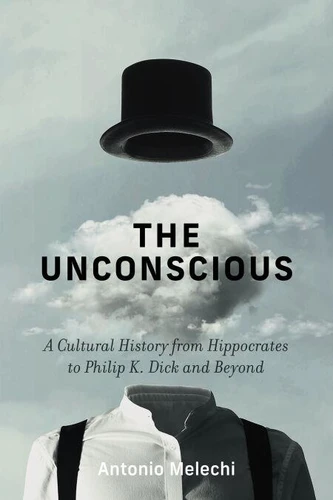The Unconscious. A Cultural History from Hippocrates to Philip K. Dick and Beyond
Par :Formats :
Actuellement indisponible
Cet article est actuellement indisponible, il ne peut pas être commandé sur notre site pour le moment. Nous vous invitons à vous inscrire à l'alerte disponibilité, vous recevrez un e-mail dès que cet ouvrage sera à nouveau disponible.
Disponible dans votre compte client Decitre ou Furet du Nord dès validation de votre commande. Le format ePub protégé est :
- Compatible avec une lecture sur My Vivlio (smartphone, tablette, ordinateur)
- Compatible avec une lecture sur liseuses Vivlio
- Pour les liseuses autres que Vivlio, vous devez utiliser le logiciel Adobe Digital Edition. Non compatible avec la lecture sur les liseuses Kindle, Remarkable et Sony
- Non compatible avec un achat hors France métropolitaine
 , qui est-ce ?
, qui est-ce ?Notre partenaire de plateforme de lecture numérique où vous retrouverez l'ensemble de vos ebooks gratuitement
Pour en savoir plus sur nos ebooks, consultez notre aide en ligne ici
- Nombre de pages270
- FormatePub
- ISBN978-0-262-05103-3
- EAN9780262051033
- Date de parution10/02/2026
- Protection num.Adobe DRM
- Infos supplémentairesepub
- ÉditeurThe MIT Press
Résumé
A highly original first anthology on the cultural history of the unconscious that is destined to become definitive."Know thyself"-the injunction that was once inscribed upon the Temple of Apollo-became a touchstone for classical and modern philosophers before being embraced as the endgame of psychoanalysis by Freud and his followers. The conceptual baggage that Freud took on his armchair journey into the unconscious mind is well known-and so, too, is the more recent science on implicit memory, blindsight and automatic processing-but the history of the unconscious beyond the consulting room and laboratory has largely been overlooked.
From ancient dream theory to hypnosis, somnambulism to psychedelic mind-expansion, The Unconscious by Antonio Melechi traces the wider social and scientific history of the unconscious mind. It brings together a chorus of voices-including Friedrich Nietzsche, Henri Bergson, Mary Arnold-Forster, Swami Vivekananda, and Philip K. Dick, to name only some-to investigate the elusive psychology of memory and learning, instinct and imagination, creative breakthrough and mental breakdown.
Moving beyond the familiar psychoanalytic framework, the book draws on a rich seam of sources, including case studies, psychological experiments, pulp fiction, urban legend, and commercial hype. Approaching the unconscious as a product of both discovery and invention, the anthology underscores its importance as a perennial source of debate, a tantalizing mirror to our hidden selves, and a powerful master key that continues to influence contemporary thought.
From ancient dream theory to hypnosis, somnambulism to psychedelic mind-expansion, The Unconscious by Antonio Melechi traces the wider social and scientific history of the unconscious mind. It brings together a chorus of voices-including Friedrich Nietzsche, Henri Bergson, Mary Arnold-Forster, Swami Vivekananda, and Philip K. Dick, to name only some-to investigate the elusive psychology of memory and learning, instinct and imagination, creative breakthrough and mental breakdown.
Moving beyond the familiar psychoanalytic framework, the book draws on a rich seam of sources, including case studies, psychological experiments, pulp fiction, urban legend, and commercial hype. Approaching the unconscious as a product of both discovery and invention, the anthology underscores its importance as a perennial source of debate, a tantalizing mirror to our hidden selves, and a powerful master key that continues to influence contemporary thought.
A highly original first anthology on the cultural history of the unconscious that is destined to become definitive."Know thyself"-the injunction that was once inscribed upon the Temple of Apollo-became a touchstone for classical and modern philosophers before being embraced as the endgame of psychoanalysis by Freud and his followers. The conceptual baggage that Freud took on his armchair journey into the unconscious mind is well known-and so, too, is the more recent science on implicit memory, blindsight and automatic processing-but the history of the unconscious beyond the consulting room and laboratory has largely been overlooked.
From ancient dream theory to hypnosis, somnambulism to psychedelic mind-expansion, The Unconscious by Antonio Melechi traces the wider social and scientific history of the unconscious mind. It brings together a chorus of voices-including Friedrich Nietzsche, Henri Bergson, Mary Arnold-Forster, Swami Vivekananda, and Philip K. Dick, to name only some-to investigate the elusive psychology of memory and learning, instinct and imagination, creative breakthrough and mental breakdown.
Moving beyond the familiar psychoanalytic framework, the book draws on a rich seam of sources, including case studies, psychological experiments, pulp fiction, urban legend, and commercial hype. Approaching the unconscious as a product of both discovery and invention, the anthology underscores its importance as a perennial source of debate, a tantalizing mirror to our hidden selves, and a powerful master key that continues to influence contemporary thought.
From ancient dream theory to hypnosis, somnambulism to psychedelic mind-expansion, The Unconscious by Antonio Melechi traces the wider social and scientific history of the unconscious mind. It brings together a chorus of voices-including Friedrich Nietzsche, Henri Bergson, Mary Arnold-Forster, Swami Vivekananda, and Philip K. Dick, to name only some-to investigate the elusive psychology of memory and learning, instinct and imagination, creative breakthrough and mental breakdown.
Moving beyond the familiar psychoanalytic framework, the book draws on a rich seam of sources, including case studies, psychological experiments, pulp fiction, urban legend, and commercial hype. Approaching the unconscious as a product of both discovery and invention, the anthology underscores its importance as a perennial source of debate, a tantalizing mirror to our hidden selves, and a powerful master key that continues to influence contemporary thought.



